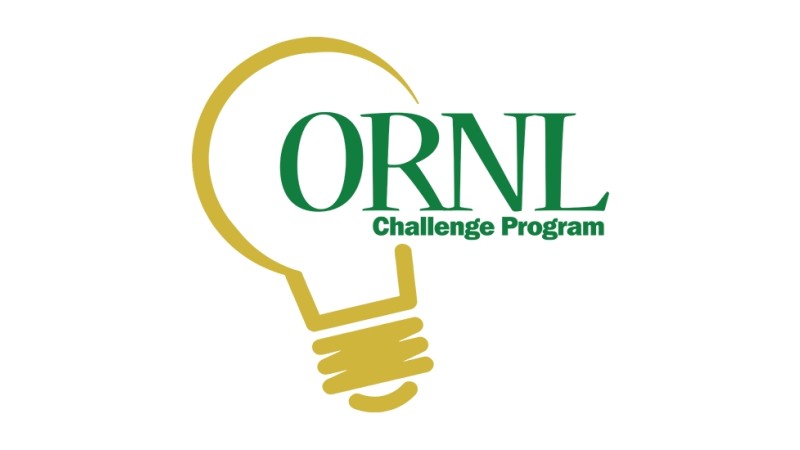The Neutron Sciences Directorate (NScD) at Oak Ridge National Laboratory (ORNL) is cultivating new talent for neutron scattering through a unique internship experience for undergraduates called the ORNL Challenge Program.
Neutron scattering is a unique research tool that uses neutrons to probe the structure and properties of materials for a variety of scientific applications. ORNL’s premier facilities for neutron scattering research advance knowledge in areas including materials science, biology, chemistry, and physics.
ORNL Challenge takes a student-centered approach to mentoring as part of a strategic effort to invigorate ORNL’s world-class internships and graduate programs with creative-thinking undergraduates. ORNL and Oak Ridge Associated Universities (ORAU) partnered to create the pilot program, designed to deepen the connections between ORNL’s scientists and university faculty, opening wider collaborative opportunities for student mentoring and research.
The challenge contest is two-part. First, ORNL researchers and faculty at core universities collaborate to propose “grand challenge” questions in energy science in a lab-wide competition. Second, the winning science challenges are released nationally to junior and senior undergraduates via ORNL’s website.
“This is a really unique way to identify top undergraduate talent and at the same time strengthen ORNL’s ties to partner universities,” said ORAU’s Craig Layman.
Admission to the challenge program is merit-based. Students submit proposed solutions to one of the challenge questions and are evaluated as candidates based on the quality of their proposals. Selected winners are invited to participate in a Summer Research Institute (SRI) to conduct research on their proposals with mentors. The SRI includes a stipend and housing allowance but offers key enhancements over traditional, paid internships such as additional teaching support; opportunities for faculty, graduate student, and research staff interactions; and research seminars as well as other broadening activities.
Grand Challenge Neutron Science
Researchers from NScD partnered with university faculty for the first challenge to expose students to neutron scattering research at ORNL.
The Quantum Condensed Matter Division’s Matt Stone and Neutron Data Analysis and Visualization’s Jiao Lin joined Georgia Tech’s Martin Mourigal to collaborate on a challenge proposal involving “frustrated magnetism,” a component of condensed matter physics important to understanding the magnetic properties of materials.
“Our goal was to engage students with the capabilities and cutting-edge scientific research performed at ORNL’s neutron scattering facilities,” said Stone.
Because neutrons are sensitive to magnetic properties in materials, neutron scattering experiments can probe the complex arrangement of atoms in quantum materials and help researchers explore properties like magnetism and superconductivity. Research in quantum materials holds the promise of more energy-efficient materials and technologies, including next-generation electronic devices.
The mentors’ questions challenged students to simulate or design artificial model magnets. Only Patrick “Ricky” Nave, Florida State University, and Michael Waddell, Columbia University, succeeded in demonstrating solutions. Both earned spots at the Spallation Neutron Source to work with Stone, Lin, and Mourigal on individual projects in neutron scattering data analysis.
Training Future Physicists
ORNL Challenge acts as a catalyst for strategic workforce development. “The program was built with the goal of keeping top students engaged with ORNL long term, through our Graduate Opportunities, and partnering with university faculty to cultivate an expertly trained workforce,” said Ian Anderson, director of Graduate Education and University Partnerships at ORNL.
Both Nave and Waddell completed the SRI in 2016 and have continued at ORNL through subsequent internships. Waddell works with ORNL user Simone Billinge at Columbia to analyze challenging data sets for materials research. Nave continues to work with mentors Stone, Lin, and Mourigal researching how to appropriately analyze more complicated neutron scattering measurements.
Nave’s work has grown from his initial challenge proposal. “Early on, Ricky demonstrated potential in contributing to solving problems regarding data analysis of inelastic neutron scattering measurements, and as mentors we wanted to encourage that pursuit,” said Stone.
Data from neutron scattering experiments can sometimes be “blurry” and difficult to interpret, explained Lin. “Better information processing techniques would enable more materials science research to be done at ORNL’s neutron scattering facilities.”
“Armed with knowledge of cutting-edge applied mathematics, Ricky completely transformed his own project and very quickly grew out of the box we initially defined.” said Martin Mourigal, an assistant professor in physics at Georgia Tech. “Ricky led us along a new and exciting path.”
Nave’s work transitioned into a year-long Higher Education Research Experience funded by ORNL’s Neutron Data Analysis and Visualization Division. He recently presented the results of his research with mentors at the 2017 annual meeting of the American Physical Society (APS) and was welcomed into the fold by fellow physicists.
“My trip to APS was an excellent introduction to the professional aspects of the physicist’s career, and I was fortunate to make connections there with prominent members in the field of condensed matter physics,” said Nave. Briefly discussing topological states of matter with Nobel Prize–winning physicist Duncan Haldane was a memorable highlight.
Nave has been admitted to Duke University’s graduate program and will begin as a doctoral candidate in mathematics this fall.
Sharpening Scientific Knowledge
ORNL’s many education programs provide enriching opportunities for students, faculty, and researchers. Students are exposed to the facilities and expertise of the national laboratory system, and they receive first-rate mentorships. And mentors also benefit profoundly from the exchange with students.
“Students are an important component of advancing science,” Anderson emphasized. “Exposure to students is invigorating for our researchers. Fresh minds and novel thinking are what lead to innovative approaches and new discoveries.”
Stone, Lin, and Mourigal all underscored the value of student perspectives. As Stone described, “Undergraduates bring a completely different perspective. They ask pointed questions that in turn help to sharpen scientific knowledge as a whole.”
The Spallation Neutron Source is a DOE Office of Science User Facility. UT-Battelle manages Oak Ridge National Laboratory for the DOE Office of Science. The single largest supporter of basic research in the physical sciences in the United States, the Office of Science is working to address some of the most pressing challenges of our time. For more information, please visit science.energy.gov.—by Ashley Huff




